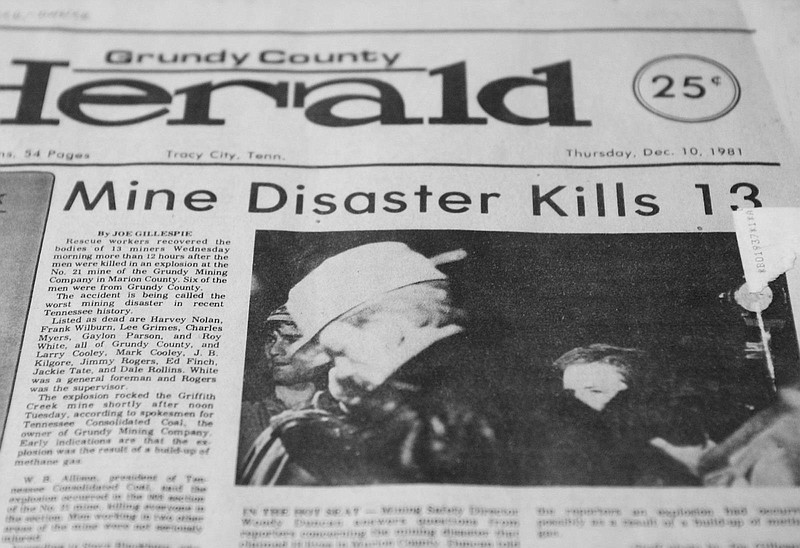Learn more
› What: The Marion County Coal Miners Museum which tells the history of mining in the area. Retired miners and relatives eagerly pass on their experiences.› Where: 300 A Main St. in Whitwell› When: 8 a.m.- 4 p.m. CST Friday and from 8 a.m. to noon CST on Saturday› Cost: Free; donations are accepted› More info: Go to www.coalminersmuseum.com or call 423-658-6868.
Thirty-seven years ago on the morning of Dec. 8, 1981, 30 miners rode three miles inside Whitwell Mountain to work their shift at Grundy Mining Co.'s Mine 21. Around noon a massive methane gas explosion rocked the mountain, blowing out the headlights of trucks parked 100 feet from the mine entrance. Teams with oxygen respirators dug through the shaft for six hours before finding burned bodies. The accident took the lives of 13 miners and brought the weekly toll to 24 in Appalachian mine disasters.
Gov. Lamar Alexander responded: "I hope federal mine safety and health inspectors, the company and all other mine operators in Tennessee will review this tragedy to see if there are lessons to be learned to make sure accidents are prevented and lives are saved in the future."
Coal had first been discovered in the south end of the Cumberland Plateau by Thomas Wooten in 1852. Originally known as Cheekville, Whitwell was renamed in 1877 after Thomas Whitwell, a British metallurgist, inventor and coal investor. The success of the mines led in 1887 to the extension of the short-line Sequatchie Valley Railroad from Jasper to Whitwell. Mining was the primary means of employment in the area, and Whitwell became known as the "Coal City of the Sequatchie Valley."
Jewel Shadrick, a retired miner and volunteer at todays' Whitwell Coal Miner's Museum, reflected: "Well, it was a way of life, we didn't know any better. And it paid well paid real good, paid good money and had good benefits We had everything in the world given to us you know, working at the mines and it was a joy to get up in the morning and go to work and everybody was a family. We knew the risks."
Most miners and their families traded with script and tokens in obtaining goods at company stores. Some thought Grundy Mining took advantage of the workers with inflated prices, but most felt that the company listened to and treated its employees fairly.
While not on the same scale as the disasters in Fraterville, Rocky Top, Tennessee (May 19, 1902, in which 216 miners were killed) or Cross Mountain near Briceville, Tennessee (December 9, 1911, in which 84 died), the Mine 21 accident was the worst disaster in Tennessee since the introduction of modern safety precautions. The U.S. Department of Labor ruled that " a cigarette lighter taken into a coal mine in violation of Federal regulations touched off a methane explosion" and "accused the Grundy Country Mining Co., the mine's operator of failure to evacuate workers from a methane-laden shift, to adequately ventilate the shaft and to enforce a Federal regulate on smoking materials in the mine."
The matter later went to the U.S. Committee on Labor and Human Resources chaired by Sen. Edward Kennedy. Most widows settled with the company for $1 million for each husband without assigning blame. One widow sued the federal government for not enforcing the law. The mines closed in 1996.
Times have changed for the economy in the area. Families are no longer dependent on coal to support their community, as new industries related to stoveware and chemicals have created a diversified economy. But the Dec. 8, 1981, tragedy has not been forgotten.
Danny Shirley, Confederate Railroad singer and Whitwell native, accompanied by musician Davey Smith and his band have preserved a sense of the tragedy in their song "Whitwell Mine." The Pearl Snap Preachers in their creation Whitwell Mine 21 remind us of the lasting effect of the disaster on the community.
University of the South students, Kelsey Arbuckle, whose grandfather was one of the 13 men killed, and Grundy County student Alexa Fults spearheaded a project to preserve this important chapter of Whitwell's mining history. Sewanee Alumnus Stephen Garret produced and professor Chris McDonough directed the resulting film "Mine 21." A trailer can be viewed at www.mine21.com.
Jerry Summers is an attorney with Summers, Rufolo and Rodgers. Frank "Mickey" Robbins is an investment adviser with Patten and Patten. For more visit Chattahistoricalassoc.org.
